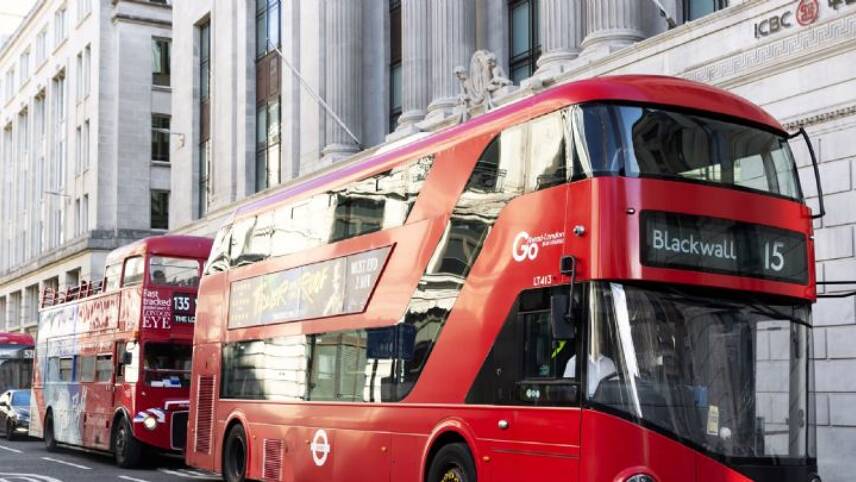Register for free and continue reading
Join our growing army of changemakers and get unlimited access to our premium content

Policies would need to support bus and rail services
A new TUC report, produced for Transport for Quality of Life, has been published today (12 April). The report sets out an investment plan to cut car use while boosting the use of public transport in order to meet the UK’s target to cut emissions by 68% by 2030.
The UK Government pledged £2bn to walking and cycling as part of its Covid-19 recovery plans – specifically the Ten-Point Plan for a Green Industrial Revolution. The Plan also earmarked £3bn for decarbonising and expanding public transport networks.
Nonetheless, the Government has repeatedly been warned that its plans for decarbonising transport do not place enough of a focus on modal shift – the need to ensure that more journeys are taken using active transport and other zero or low-carbon options. The Climate Change Committee’s (CCC) most recent annual progress report to Parliament confirmed that the Transport Decarbonisation Plan, if enacted in full, will likely only bring about half of the emissions reductions needed through to the mid-2030s.
The TUC says that its new recommendations would fill a “gaping hole” in the recently updated Net-Zero Strategy, which failed to explain how the nation will achieve the ‘modal shift’ away from cars as highlighted by the CCC.
To reach the 2030 emissions target, a reduction in total car mileage of at least 20% is needed. The Scottish government has already set a target to achieve this reduction but adequate policies have not been put in place across the rest of the UK.
The TUC proposes that the Government deliver a 10% car mileage reduction through car-sharing and measures that reduce travel, such as working from home, remote technologies and better planning and land use. Additionally, a 10% car mileage reduction could be delivered by a modal shift to public transport.
The report also proposes a 120% increase in journeys by bus and tram and an 80% increase in rail journeys in order to meet future climate goals. Enabling this change, the TUC states, would require both branches of HS2 to be completed, delivering a Northern Powerhouse Rail including connection to HS2 and a Midlands Rail Hub that would add 14 million seats to the rail network each year.
Additionally, the Government would need to fully electrify the rail network and introduce a new guarantee of an hourly bus service for every village.
TUC General Secretary Paul Nowak said: “Everyone knows that we have to cut carbon emissions – and that switching to public transport is a big part of how do it. Investing in public transport will help us meet net zero targets and reduce the threat of catastrophic climate change. And it creates jobs throughout England and Wales, boosts the economy in every community, and improves everyone’s quality of life.
“Commuters will have faster and cheaper journeys to work. New connections will bring new businesses to places where people need economic opportunities. We will save lives with cleaner air. And we will reduce loneliness and isolation by making everyone better connected, wherever you live.
“With this report, we’ve done the work that Conservative ministers should have done with their empty and incompetent net-zero strategy.”
TUC notes that the plan would required an average of £9.9bn in annual expenditure up to 2035, namely to create the rail links and electrify the network. Additional operational costs for expanded bus, tram and rail services would reach £18.8bn annually by 2030.
However, the TUC notes that the plan would deliver an estimated £52bn annual boost to GDP by 2030 due to productivity gains. Additionally, 140,000 new jobs would be created to support expanded public transport networks and a further 830,000 jobs would be created in manufacture, construction, and infrastructure for buses and trams up to 2035. Up to 1.8 million jobs would be supported indirectly through the rail investment.
One of the major productivity boosts would come from the fact that more households would have increased routes and access to work, retail and seeing family. As of 2020, 20% of UK households had no access to a car, rising to 35% in the lowest income bracket.
At the start of the year, the Department for Transport (DfT) confirmed a £32.9m scheme to launch local walking and cycling schemes across the UK.
Councils will need to apply for a share of the funding and will need to clarify their plans for ‘capability’ improvements and improving infrastructure. The former refers to training and retaining local members of staff – including engineers, planners and facilitators – to develop and deliver schemes. Staff will be supported to plan, consult, deliver and communicate schemes.


Please login or Register to leave a comment.